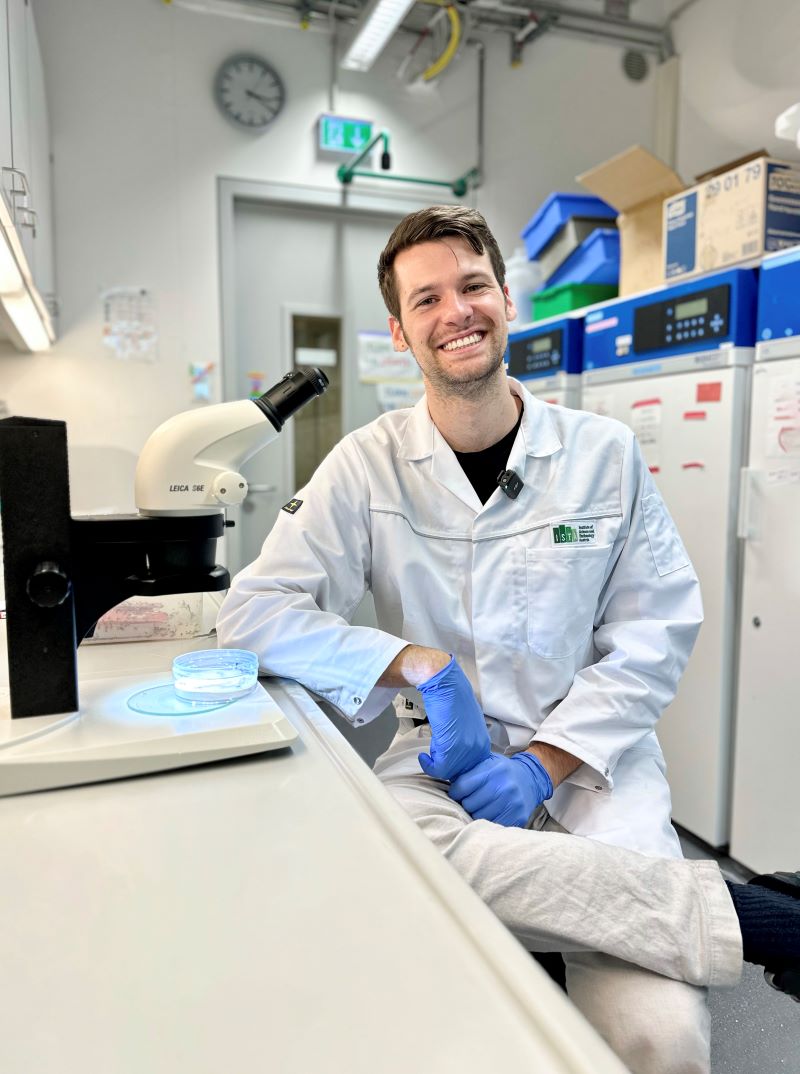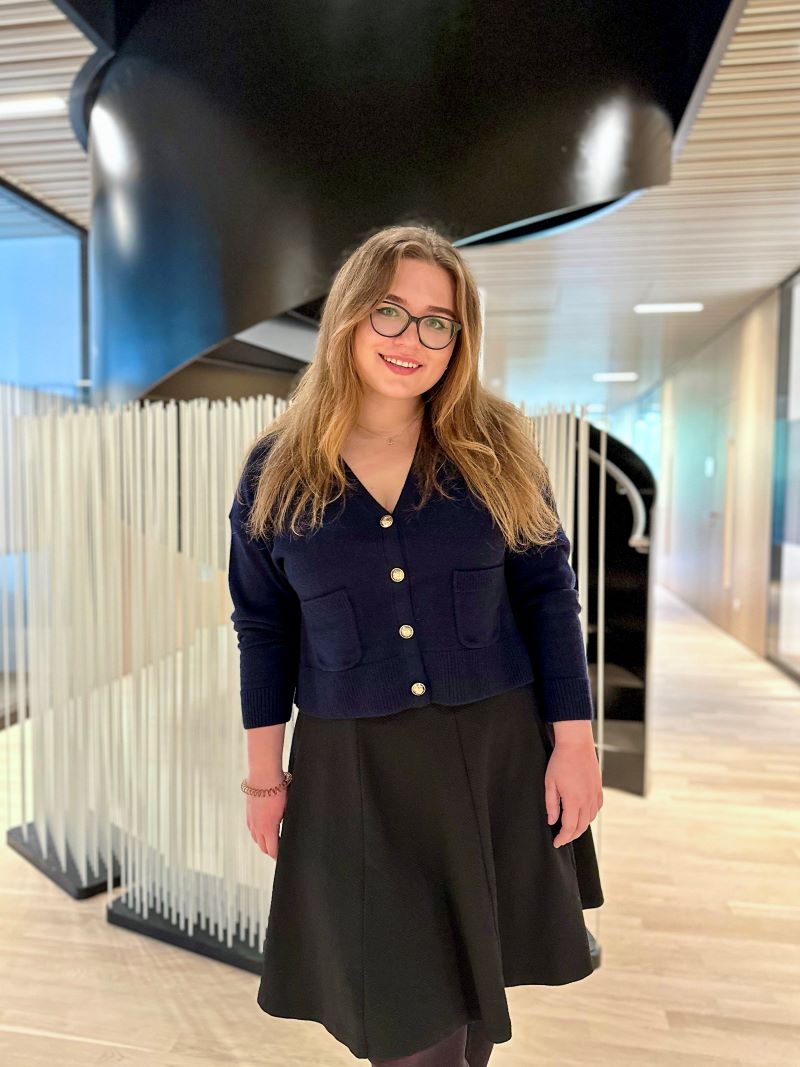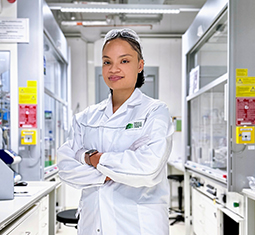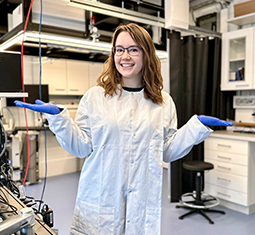November 21, 2023
Spark a (Research) Flame
What is it like to make your PhD at ISTA?
Starting your PhD straight after your bachelor’s? Exploring different research groups throughout your first year on campus? The Graduate School at the Institute of Science and Technology Austria (ISTA) provides a cross-disciplinary education to train the researchers of tomorrow. We sat down with current PhD students Roksolana Kobylinska and Lukas Lindorfer to shed light on their experiences and how the first-year rotation aids in finding your ideal research question.

Hi Roksolana and Lukas, nice to meet you. You are both PhD students at ISTA, yet at different points in your scientific journey. What brought you to ISTA?
Lukas Lindorfer: Believe it or not, my journey started with the most curious individuals: kids! I worked as an elementary pedagogue in a kindergarten. However, at the age of 22, my curiosity led me to study biology, and I earned my bachelor’s degree. One could say that working in the kindergarten brought me to the place where I would go on to pursue my PhD—I found ISTA through a parent of a child in my group who happened to be a postdoc here.
Roksolana Kobylinska: I finished my bachelor’s at the University of Vienna last October. Honestly, I didn’t have a concrete plan for what was next. Nevertheless, inspiration often strikes at the most unexpected moments. In February, I visited a friend who’s pursuing his PhD at ISTA, and that’s when my journey took an exciting turn. Discovering that I could dive into a PhD journey right after my bachelor’s made it a perfect fit for me!
Lukas, you are in your third year of your PhD, and you are studying social immunity in ants in Sylvia Cremer’s lab. What’s your research about?
LL: Ants have remarkable ways of fighting epidemics in their nests through grooming, interaction changes, and even self-sacrifice. Currently, I’m studying their nest disinfection process in real-time. Ants spray their nests with acidic poison, which we suspect acts much like a disinfectant. By introducing contamination, we can test how efficient this spraying actually is in neutralizing the contamination.
Very interesting. How did you decide in which research field you wanted to pursue your PhD? Have you always been fascinated with ants?
LL: My PhD studies deviate strongly from the subjects of my bachelor’s. I discovered my passion for evolutionary biology and social immunity thanks to the rotation phase of the PhD program, where you can explore different fields to find your match. Honestly, I never would have tried this without being given the opportunity here at ISTA!

Speaking of the rotation phase. Roksolana, you are currently right in the middle of it. How has your experience been so far?
RK: It is another reason why I chose ISTA. As a molecular biologist with a passion for developmental biology and cell homeostasis, I’m exploring different groups that align with my interests. This way, I have the chance to figure out which lab is the right place for me. Another fascinating part is that you can even switch fields, affiliating with a group focusing on a different research area.
Since it was not that long ago, how was the application process?
RK: My application process was straightforward and swift. During my interviews, I felt like the professors were truly eager to understand my passion for research and get to know me. Of course, the time while you’re waiting for the admission letter is very nerve-wracking, so you’d better find a way to be busy and not check your email every day.
Could you share a few insights into the first weeks at the Institute?
RK: Believe me, starting your PhD journey at ISTA is more than worth it! The Graduate School’s pre-semester program is amazing—full of social activities and events to get familiar with the campus and its community. We are 66 students in the new cohort, and I find it really inspiring to talk about science with researchers from different backgrounds.
It’s great to have a supportive community on campus. Lukas, how did the interdisciplinary learning, the ISTA community, faculty, and research facilities contribute to your research and personal growth as a PhD student?
LL: With the institute’s state-of-the-art facilities, collaborative atmosphere, and multidisciplinarity, I have the freedom to pursue my research interests and broaden my horizons by exploring fields I had no prior experience in. Also, as students from all study tracks start in the same cohort, one might make friends who become experts in NMR spectroscopy, epigenetics, plant hormones, and so on. This obviously improves the flow of useful information during coffee breaks.
Any last-minute advice for future applicants?
LL: Be open-minded. You might think you know a lot (which you most likely do), but be aware that the more you know, the more you realize you don’t know. ISTA is a place where you will be able to deepen your knowledge more than in most other places—and have fun along the way!
RK: To all future applicants: Stay open, be proactive, and find out as much as you can about the research of the groups at ISTA you are interested in.

What about you? Did it spark a flame? Are you ready to start your own academic adventure?





